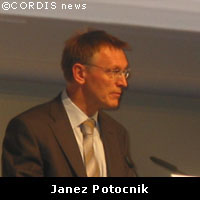Conference sets out priorities for infrastructure implementation
Researchers, policy-makers and other stakeholders have highlighted the importance of research infrastructures to the future of European science. The conclusions to the European Conference on Research Infrastructures (ECRI2007), which took place in the German city of Hamburg on 5 and 6 June, state that 'the conference underlines the importance of research infrastructures for capacity building, the training of researchers and the generation and transfer of new knowledge'. The European Roadmap for Research Infrastructures, which was published last October by the European Strategy Forum on Research Infrastructures (ESFRI), was widely praised throughout the conference, and delegates urged policy makers to implement the roadmap as soon as possible. The European Commission already has a budget line for research infrastructures under the Seventh Framework Programme. 'Under FP7, the Commission is committed to contribute to the emergence of these new projects and to play a catalysing role in the forthcoming negotiations, by funding the so called 'preparatory phase',' commented EU Research Commissioner Janez Potocnik at the opening session of the conference. The Commission is also supporting work, which will hopefully lead to agreements on the legal and management structures of new pan-European facilities. This was also identified as a priority by conference delegates. The delegates also point out in their conclusions that a pre-requisite for the implementation of the ESFRI roadmap is the development of national roadmaps. Attention also needs to be paid to the international aspect of infrastructures, and the delegates called for greater collaboration with global partners on infrastructure development. A good example of such a collaboration which was mentioned several times throughout the conference is ITER, the International Thermonuclear Experimental Reactor. 'The international dimension of ITER is an opportunity and a challenge,' commented ITER Deputy Director General Carlos Alejaldre, explaining the pros and cons of such a huge global project. Other issues which need to be addressed to ensure the realisation of the 35 projects identified by ESFRI include the availability of top talents and researchers, the effective financial management of projects by combining funding from different sources and the use of e-infrastructures to allow for optimum connections. Prior to the start of the conference, the X-ray Free-Electron Laser (XFEL) project was launched. The XFEL is the first project identified by ESFRI to get underway.
Countries
Germany



